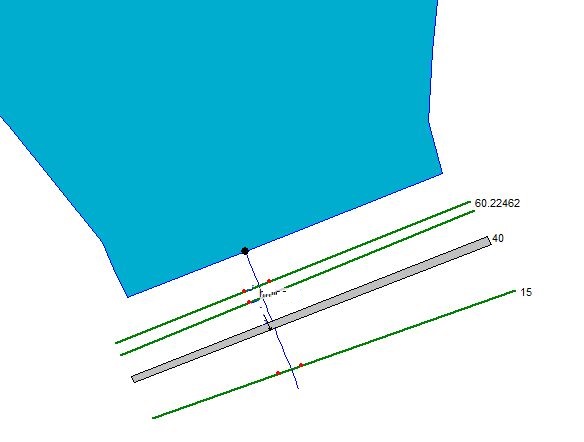Forum Replies Created
-
AuthorPosts
-
RobertParticipant
Hi
This is difficult question for:
large or small dam
earth dam or rockfill damI think, you should use all equations for breach parameters estimations. Then you can/should compare your results (parameters of dam, width of breach, failure of breach) with database of failure dams (Bureau of reclamation- 108 case of dams failure).
By the way: i would choose a Froehlich 2008 🙂
regards!
robertRobertParticipantHi Jonathan
Theory:
Enegry grade line have to decrease gradually along of river. EGL or EG equals water surface head + velocity head. You would look a law conservation of energy!Your issue can be a result:
– enough cross sections (Geometric Data – Tools – XS interpolation)
– HTAB computation points (Geometric Data – HTab Parameteres: Increment=0.1 and Points: 100)I think, that your issue is in the HTAB!!!
I recognize to study very good articels by Ch. Goodell (see you):
http://hecrasmodel.blogspot.sk/2009/06/energy-grade-line-problems.html
http://hecrasmodel.blogspot.sk/2009/02/crazy-energy-grade-line.html
http://hecrasmodel.blogspot.sk/2009/02/crazy-energy-grade-line.html
http://hecrasmodel.blogspot.sk/2013/10/stabilizing-dynamic-unsteady-hec-ras.htmlIn the case of the next questions you can write me
Have a nice day!
RobertRobertParticipantHi
I could help with your problem, but you have to send me printscreen or the betst is all project by debug report (Hec-RAS-File)
Regards!
RobertRobertParticipantHi
You have two options:
1. Levee
2. Lateral structureI would use the levees, becasue they are simpler to work (creating, editing, removing).
regads!
RobertRobertParticipantHi Simone
Is is very difficult to advice you, when I don´t see your model.
You can send me your project using (File- Debug report)Regards!
RobertJanuary 30, 2015 at 12:57 am in reply to: Warning:”The energy equation could not be balanced…” in steady flow simulation. Any solutions? #9090RobertParticipantHi
I agree with you, that energy grade line cann´t oscillate. Value E.G.elevation must decrease/fall to downstream!
You have two resolution:
1. Edit the crossection spacing- you have to adjust SC spacing to slope using tool XS interpolation
2. Edit HTab ´Hydraulic Table Propertiets´ – Geometry Data- HTab param- Point (for all points set Values 100) and Increment (for all Increment Copy Invert).Mr. ChrisG wrote excellent article for this theme: http://hecrasmodel.blogspot.sk/2009/06/energy-grade-line-problems.html
Regards!
RobertRobertParticipantHi
I was looking your model and I think, that your geoemetry isn´t correct. In the appendix I send you an example of correct gemetry (level-pool routing). You have to look a possition of objects: basin, 2 CS, dam and CS.
When I solve dam break analysis, so I cretae a two models. The first model is solved an estimation of flow hydrographs from breach. The second Is solved a downstream routing.
How did you estimate breach parameters: breach bottom width, failure time? Did you use: comparative analysis, empirical questions and mathematical models?
What type dam do you simulate?RobertParticipantHi
Could You send any pictures/printscreen from your model? Or you can share your project and I try to solve your problem.
Your project can you compress using: Hec-RAS- File- Debug Report!!!Regards!
RobertRobertParticipantGood day,
You have a right, that a concrete dam failure is suddendly (Qmax=0h:0m)
I was solving concrete dam break using method level-pool routing, because I had a limited input data (volume curve) for reservoir. (I couldn’t use dynamic routing method)
After, you have to determine a breach characteristic (location, shape and size) in the concrete dams.
Example:
Location- near a functional object (weir gate)
shape and size- the entire block as the foundation/base/groundSome printscreen from my project (see links)
https://drive.google.com/file/d/0B6wWUzbPUM0dMERpV2tvNDhTRDA/view?usp=sharing
https://drive.google.com/file/d/0B6wWUzbPUM0dZWxOV0dpT0ZSVUE/view?usp=sharing
https://drive.google.com/file/d/0B6wWUzbPUM0dT3RudGcwN2dPSEk/view?usp=sharingRegards!
RobertRobertParticipantHi,
Today, I solved this problem successfully.
Here is a manual:
The DLL that is conflicting with RAS is gonna be in C:\Windows\system32 or C:\Windows\SysWOW64 and is named hdf5dll.dll. Rename that file if you find it to hdf5dll.dll.backup in either one of the system folders and RAS should work.In my case, this bug was caused by software FLO-2D. I have notified the FLO-2D developers of this issue and are trying to find a workaround of our own before the final 5.0 release.
Greetings!
Robert S.RobertParticipantHi,
I would try to reinstall Hec-RAS!
Greetings!
RobertParticipantHi,
In the packet HEC-RAS_5.0_Beta_2014-10-01 are:
– the installation setup package “HEC-RAS_5.0_Beta_2014-10-01_Setup.exe”,
– 2 examples “RAS_50 Test Data “,
– PDF version of the User’s Manualhttp://www.hec.usace.army.mil/misc/files/ras/HEC-RAS_5.0_Beta_2014-10-01.exe
The exercise to load terrain model in 2d ras mapper is in the manual (page 11 – 21).
I hope, that I help you,
Greetings!RobertParticipantHi,
I compared the volume in the first cross section vs. the one downstream end of the model, but in the volume is big dfiference. see link(apendix 1 – 4).
https://drive.google.com/folderview?id=0B6wWUzbPUM0dZUJ4N0ZLT0ZZTDQ&usp=sharingHydrographs 1 – 3 are a small difference, but between 3 and 4 are big difference. Where could be the problem ?
thank you very much for you time
Greetings!RobertParticipantHi,
I was solving this problem also in LinkedIn.
I got some replies:
1. You could do a comparison analysis by routing the hydrograph in HMS using Muskingum-Cunge.
2. You need to look for volume continuity between the first cross section downstream of the breach and the last model section.How do you solve it? Can you help me?
thank you very much your time
Greetings!RobertParticipantHi jarvus,
i am working with 1D unsteady flow. My model is stability, but i want to check of the output using of the continuity equation.
For example:
RS 0 m, 781.72 m3/s
RS 395.72 m, 750.19 m3/sCan you help me?
thank you very much
Greeting! -
AuthorPosts
